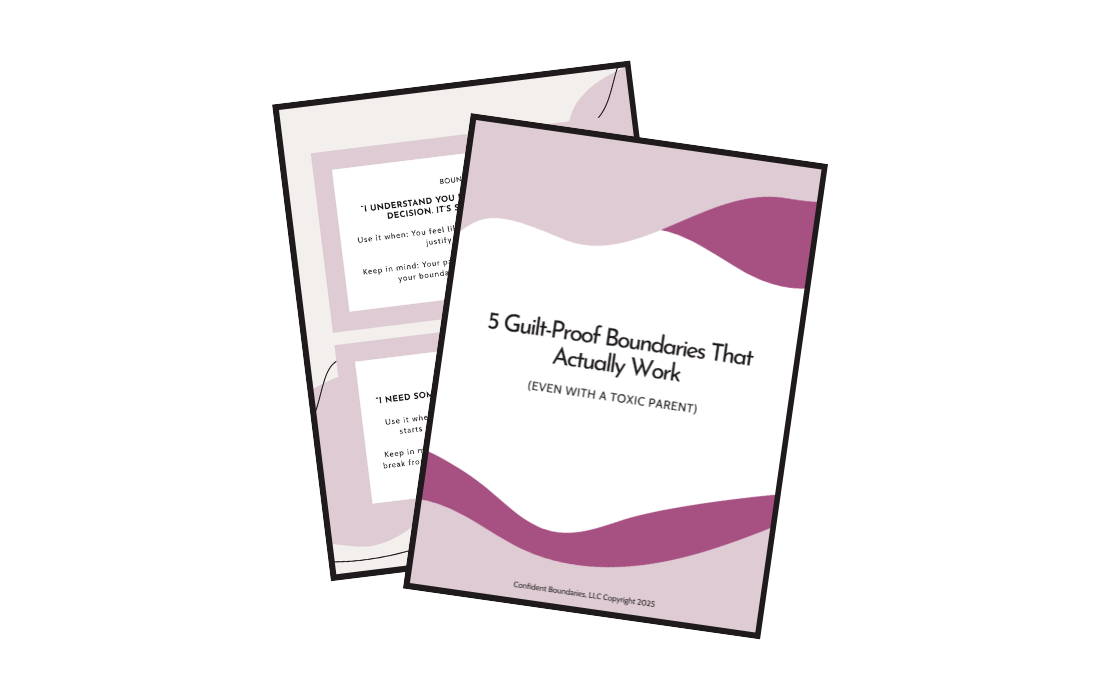
Parental Manipulation Unpacked: Reclaiming Your Peace and Power
If you grew up in a dysfunctional family with emotionally immature parents—especially those with borderline or narcissistic personality disorder—you already know how draining those relationships can be. You were probably gaslit, guilt-tripped, or emotionally shut down more times than you can count.
And even now, as an adult, you might still be dealing with the fallout.
I need you to know- you’re not crazy.
You were raised in an environment where manipulation was normalized. And if you're finally starting to question it, push back on it, or set boundaries with your parent? That’s not rebellion. That’s healing.
Let’s unpack what parental manipulation really looks like—and more importantly, what to do about it.
The Many Faces of Parental Manipulation
Parents with traits of BPD or NPD often use manipulation to maintain control. And the tactics they use aren’t always obvious—some are subtle, some are loud, and all of them are damaging.
Here’s how it typically shows up:
Gaslighting
Gaslighting is when your parent flat-out denies your experience—telling you something didn’t happen, twisting your words, or accusing you of being “too sensitive.”
Over time, gaslighting chips away at your self-trust. You start to second-guess your memories. You wonder if you are the problem.
Let me be clear: you’re not.
They’re just rewriting history to avoid accountability.
Triangulation
Triangulation is when a parent pits siblings or other family members against each other to stay in control.
It sounds like:
-
“Your sister agrees with me—why can’t you?”
-
“Don’t tell your brother I said this, but…”
-
“I always knew you’d be the difficult one.”
This creates mistrust, rivalry, and isolation. It’s not just unfair—it’s toxic. And recognizing it is the first step toward not playing into it anymore.
Guilt-Tripping & Emotional Blackmail
“You’ll regret this when I’m gone.”
“After all I’ve done for you…”
“I guess I’m just a terrible parent then.”
Sound familiar?
This is manipulation dressed up as concern. It’s designed to make you question yourself and abandon your boundaries.
Guilt-tripping is about control, not connection.
You’re allowed to say no—without justifying it.
Projection
Parents with BPD or NPD are infamous for this one.
They accuse you of being selfish, dramatic, or manipulative—when those behaviors are actually theirs.
It’s disorienting. You start to internalize their words and doubt your character.
But here’s the truth:
Their projections are not reflections of who you are.
They’re a defense mechanism that keeps them from facing themselves.
The Silent Treatment
Withholding communication, affection, or connection is a power move.
If you ever heard, “Fine, do whatever you want,” followed by days or weeks of cold silence, that’s emotional neglect. And it’s incredibly painful—especially when you’re a kid who just wants love and safety.
As an adult?
That same silence can still trigger anxiety or guilt.
Jealousy & Competition
If your parent resented your success, competed with you for attention, or got weird when people complimented you—that’s not normal.
Narcissistic parents often see their children as extensions of themselves. So when you shine, they feel threatened.
You’re not imagining it.
They’re not proud of you because they can’t handle not being the center of attention.
This is their issue—not a reflection of your worth.
“Flying Monkeys”
When your parent recruits others—siblings, extended family, friends, or even therapists—to guilt or pressure you on their behalf? That’s flying monkey behavior.
Suddenly, you’re not just dealing with one manipulative person—you’re dealing with a whole crew.
These people may mean well, but they're enabling the toxicity and abuse. And you are not obligated to justify your boundaries to anyone, especially those being used as tools of manipulation.
What All of These Tactics Have in Common
They’re about control.
Not love. Not care. Not connection.
Control.
And the more you start to name these behaviors, the easier it becomes to stop internalizing them.
You don’t need to be more understanding.
You don’t need to “fix” the relationship.
You don’t need to keep sacrificing your peace for the sake of someone who refuses to take accountability.
Reclaiming Your Power Starts With Naming the Pattern
The moment you start to see these tactics for what they are—abusive, controlling, and emotionally manipulative—you open the door to something better.
That might look like:
-
Setting firm boundaries with your toxic parent
-
Reducing or cutting off contact
-
Choosing not to explain yourself
-
Learning how to trust your own perception again
-
Seeking support from people who actually get it
You get to rebuild your relationship with yourself.
You get to choose your mental health over old family roles.
You get to stop being the emotional caretaker in a dynamic that was never fair to begin with.
Final Thoughts: You’re Allowed to Protect Your Peace
Growing up with emotionally immature parents is disorienting.
It makes you question your instincts.
It makes you feel guilty for having needs.
It makes setting boundaries feel mean.
But here’s what I want you to know:
-
Recognizing manipulation is not being cruel.
-
Holding boundaries is not being selfish.
-
Choosing your peace is not betrayal.
It’s healing.
It’s growth.
It’s the beginning of something new.
You’re Not Crazy.
But you might have been gaslit by your parents.
Learn how to recognize the signs—and start rebuilding trust in yourself.
I hate SPAM. I will never sell your information, for any reason.



